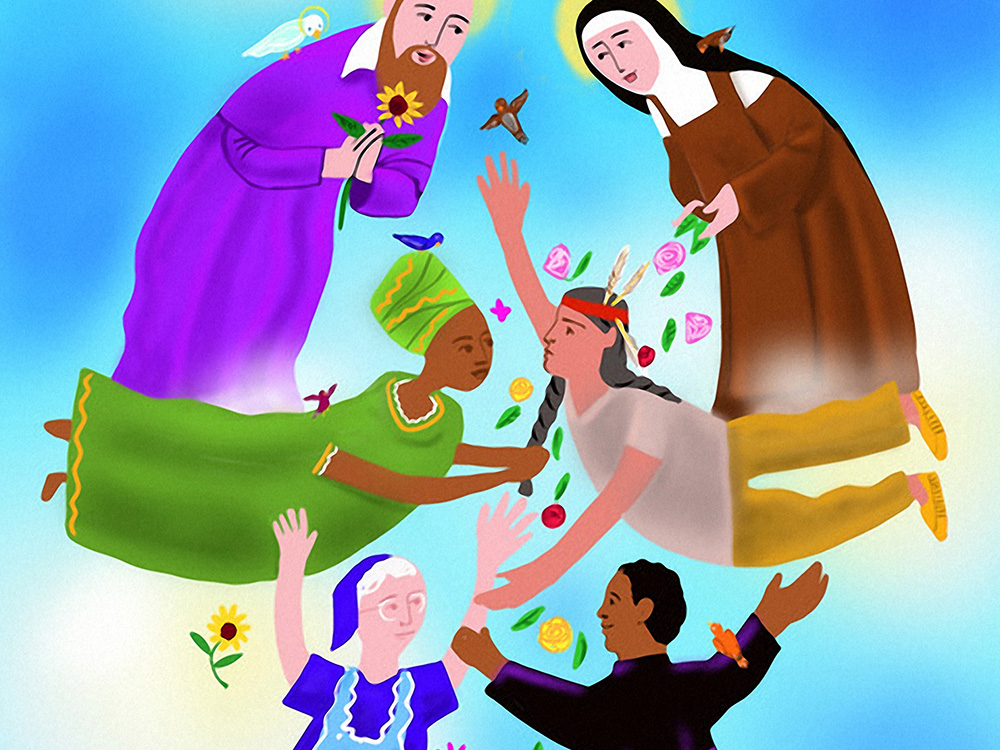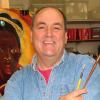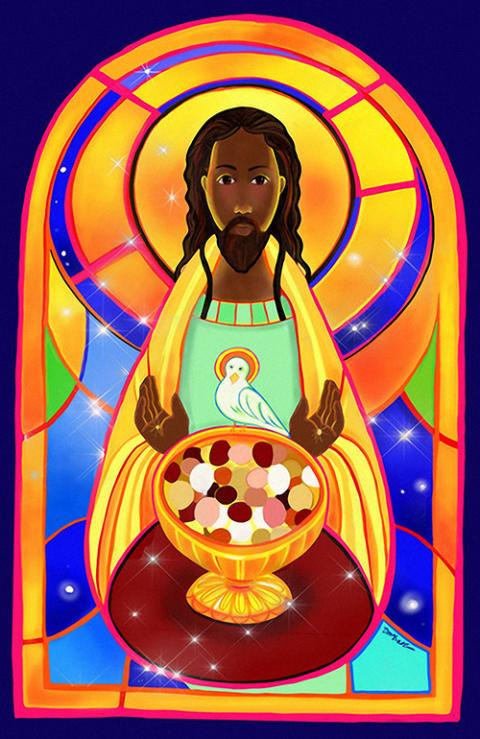
Detail from "Cloud of Witnesses," artwork by Oblate of St. Francis de Sales Br. Mickey McGrath, shows (clockwise top left) St. Francis de Sales, St. Thérèse of Lisieux, Nicholas Black Elk, Fr. Augustus Tolton, Dorothy Day and Franciscan Sister of Perpetual Adoration Thea Bowman.
I still recall the words uttered by my mom in exasperation when I was a little boy who insisted on doing things my way and in my own time: "Michael, you have a mind of your own." I am pretty sure she didn't intend those words as a compliment back then, but that is how I interpret them today when they ring in the ears of my more mature years.
Maybe that explains why my favorite saints and artists have always been the ones who came to view their own feisty, independent spirits as a gift, their willful selves part of God's will for them. They sensed that blindly obeying the rules, especially the more questionable ones, isn't necessarily the best way to build a loving relationship with God or to share God's love with a world in desperate need of it.
I recently donated a small collection of beautiful children's books I have purchased over the years to the Nick Virgilio Writers House, a facility near my art studio dedicated to promoting haiku poetry and literacy for the young people of Camden, New Jersey. It was started by Fr. Michael Doyle, a prophetic priest with a poet's soul who definitely had a saintly mind of his own.
Among the books I gathered were ones about Rosa Parks, Martin Luther King Jr., Harriet Tubman, the Quiltmakers of Gee's Bend, Nicholas Black Elk and Rabbi Abraham Heschel. I sat and read each one before packing it in the box, lingering over the wildly imaginative artwork, painfully aware that in some states and school districts these books would be banned. It broke my little woke heart.
If "woke" means being awakened to the painful realities of racism and discrimination, I guess I was woke long before it became a thing. As a child in Catholic school, I read The Diary of Anne Frank. Did it scare the hell out of me? It was a true story of a girl my age who died in a concentration camp a mere twelve years before I was born. Twelve years! It absolutely scared me. But it also taught me Christian compassion.
At that same early period in my life, the Civil Rights Movement was gaining strength. Growing up in a very white Philadelphia neighborhood meant I never witnessed it firsthand, but I watched it on the news. Water cannons and vicious Southern policemen with snarling dogs were just as scary to me as Nazi storm troopers and SS commandants.
But artists and musicians came to my rescue on the radio and in film, and my heart was awakened with the colors and sounds of hope — as it continues to be today. I was awakened by beauty and art and all those things that unite us as a human family, from opera to Motown. Dorothy Day liked to say that beauty will save the world, and I believe she was right.
Advertisement
As I envision the long and winding road of my adult spiritual journey, I see it lined with my favorite cloud of witnesses, a beloved communion of saints creating a litany of holy woke-ness from across the ages of church history — and I want to be in that number when they go marching in.
They include sassy prophets from the distant past who spoke their truths to abusive power and broke new ground: women like Hildegard of Bingen and Catherine of Siena or men like Francis of Assisi and Ignatius of Loyola. Courageous reformers like Teresa of Avila and Pope John XXIII weren't afraid to address the church's desperate need for spiritual renewal in their own times and they each did it in their own relevant way.
Dorothy Day and Titus Brandsma were great journalists who used that medium to preach anti-racist Gospel truth, and doing so got Titus martyred at Dachau.
When modern bad boys with minds of their own — those like Teilhard de Chardin and Thomas Merton — were told they couldn't publish their radical thoughts, they obeyed but kept on writing. Writers such as Francis de Sales and Thérèse of Lisieux dove below the surface of legalism to remind us that God is all about intimate love, not punishment.
Healing begins when we love and forgive ourselves and follow that up with love and mercy for others in all their colorful, sexual and cultural variety.
Black prophets like Thea Bowman and King led and guided us to endless amazing graces through music and the preached word. Black Elk and Kateri Tekakwitha enlightened us with Native wisdom and respect for creation. Óscar Romero and Mother Teresa helped us discover the presence of Christ in everyone, especially those in the most desperate circumstances.
St. Francis de Sales used to say: "Be who you are and be that perfectly well." This sounds to me like the woke secret to finding love and happiness in troubled times such as ours.
When we hide the ugly truths of history — whether church or nation — we cannot properly heal. Healing begins when we love and forgive ourselves and follow that up with love and mercy for others in all their colorful, sexual and cultural variety.
I can just hear my saintly BFFs joining in the heavenly chorus with my mom: "Michael, you have a mind of your own." I have a heart and a soul of my own as well, and I feel blessedly, blissfully woke.





